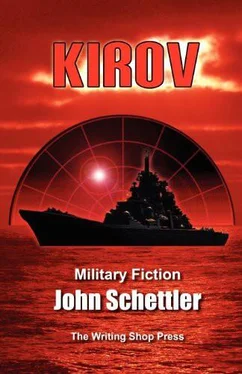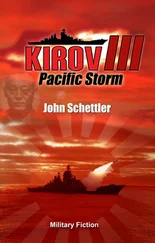John Schettler - Kirov
Здесь есть возможность читать онлайн «John Schettler - Kirov» весь текст электронной книги совершенно бесплатно (целиком полную версию без сокращений). В некоторых случаях можно слушать аудио, скачать через торрент в формате fb2 и присутствует краткое содержание. Жанр: Фантастика и фэнтези, Альтернативная история, на английском языке. Описание произведения, (предисловие) а так же отзывы посетителей доступны на портале библиотеки ЛибКат.
- Название:Kirov
- Автор:
- Жанр:
- Год:неизвестен
- ISBN:нет данных
- Рейтинг книги:5 / 5. Голосов: 1
-
Избранное:Добавить в избранное
- Отзывы:
-
Ваша оценка:
- 100
- 1
- 2
- 3
- 4
- 5
Kirov: краткое содержание, описание и аннотация
Предлагаем к чтению аннотацию, описание, краткое содержание или предисловие (зависит от того, что написал сам автор книги «Kirov»). Если вы не нашли необходимую информацию о книге — напишите в комментариях, мы постараемся отыскать её.
Kirov — читать онлайн бесплатно полную книгу (весь текст) целиком
Ниже представлен текст книги, разбитый по страницам. Система сохранения места последней прочитанной страницы, позволяет с удобством читать онлайн бесплатно книгу «Kirov», без необходимости каждый раз заново искать на чём Вы остановились. Поставьте закладку, и сможете в любой момент перейти на страницу, на которой закончили чтение.
Интервал:
Закладка:
“We could sail on in to Bedford Basin, sir,” said Fedorov, but I don’t think we’ll find anything there either. What could have done this?”
“How many warheads did that maniac Karpov unleash?” asked Volsky, looking at Samsonov.
“Sir, we fired the number ten missile in the MOS-III bank. All the rest were Moskit-IIs with conventional warheads.”
“It is clear that we did not do this with our weapons then,” said Volsky. “Though we may yet be responsible for what we are seeing here.”
“Sir,” said Fedorov. “We need to ascertain our position in time. I think it is fairly safe to say this is not Halifax of 1941. I suggest we put a shore party in for a closer look. We might find something that could tell us the date, or at least give us some better idea of what happened here.”
“Correct, Mister Fedorov. I think this is a job for Sergeant Troyak. Let us answer this question of when concerning our position, here and now.”
“If I may, sir, I’d like to accompany the landing party.”
The Admiral sent down the order, and Troyak took five marines ashore with Fedorov in an inflatable boat. They would search for anything they could secure that would shed light on their situation, but there was not much to find. Clearly the entire region had undergone a severe trauma. The damage from blast, shock and fire was evident. Most anything that would burn was incinerated, and apparently some time ago. There was no residual heat coming from the rubble piles, largely heaps of metal and concrete that had survived whatever had happened here. In places Troyak even found stone that had apparently been broiled to a hard glassy state. They returned, disheartened and chastened by the experience.
Fedorov had a haunted, defeated look on his face. “There was nothing, sir,” he said. “Nothing intact. No sign of life-no bones in the rubble either, not even a bird or a fly. Whatever happened here was severe and utterly lethal. It was not a natural event either. No tsunami or earthquake could have accounted for what we saw there. Metal was melted-rocks heated to form glass! And I think it happened some time ago, sir. The radiation levels were very low, though they decay to near normal within a hundred days of a detonation. But this could have happened much earlier, perhaps even years.”
“Only a nuclear weapon could have caused destruction on this scale,” said Volsky. “So in that we have one clue. We have not slipped further into the past, correct? Halifax was an important harbor and naval center. If it came to war-who knows when it happened-then this was a likely target, and we would be right at ground zero here if a missile was targeted to take out this harbor infrastructure.”
“There did seem to be a crater, sir.”
“Not surprising,” said Volsky. “It would have been a low air burst, and I would guess that this target would have received no less than a 150 kiloton warhead-perhaps two. That could have been fired by an ICBM, or even one of our submarines.”
“One of our submarines, sir?”
“Who else? I don’t think the British or French would have any interest in destroying this harbor, nor even the Chinese if it came to war. But it has long been on the target list for our ballistic missile submarines. I have seen the information first hand.” He shook his head sullenly. “ Borei class…We name the damn subs after the north wind, Boreas, but it is a hard wind that blew here to bring such destruction.”
“Then you are suggesting another war has broken out, Admiral? That we are back in our own time again?”
“Well that hard north wind has blown us clear of the Second World War, and now it seems we have landed in the Third! One day we will grow tired of counting them I suppose. But this is damage from a nuclear warhead, that much is clear to me.”
Fedorov had a distant, empty look on his face as he thought. The history had changed! Nothing was certain now. Nothing could be relied on from this moment forward. He glanced sheepishly at the small library of books on the shelf at his old navigation station. Much of the history in them was so much fiction now. Everything had changed, and it had come to war this time around. War was a ticking clock, he knew, remembering a poem by Kudryavitsky. Tick, tick, tick-then the Alarm clock bomb goes off taking you by surprise with its morning shock. “It's better that you hear it…” His voice trailed off, disconsolate and forlorn in tone.
“Mister Fedorov?” The Admiral looked at him, brows raised.
“A Russian poet, sir,” said Fedorov, quoting the line in full: “ Sometimes the alarm-clock looms up first, quietly ticking in the doorway. It's better that you hear it…”
Volsky nodded. “Some men never listen,” he said quietly, musing. “If war came, and this city was destroyed, then I fear it was a general exchange between Russia and the West. It is my guess that we will find much the same level of destruction if we continue on this course and visit the American coastline. All those cities would have received multiple missiles in a general exchange.”
“But why sir?” Samsonov had a blank look on his face.
“Why?” Volsky gave him a long look. “You have to look no farther than this ship to answer that, Mister Samsonov. We build them, these war machines, these ticking clocks, and they do their job with lethal efficiency. Look how we savaged the British and American navies-this single ship-and we could have done worse damage if Karpov had his way. Yet we vanished from the scene of the crime, a thief in the night as it were. No doubt they looked for us for a very long time, but all for naught. We were here, in some black future we only now begin to surmise, here with the consequences of what we have done when we so blithely put to sea with our holds crammed full of missiles and warheads. Is that not what you were trained for?” His eyes softened a bit as he went on. “No-I do not put any blame on you, Samsonov. It is what we all were trained for. The uniforms, the salutes, the niceties of rank and protocol-all these are just ways we console ourselves as we drill in the making of war. In the final analysis, this is the end of it all, yes? These are the consequences. Who knows how much of the world is left out there for us now?”
“Then what do we do now, sir?” said Samsonov. The eyes of the entire bridge crew were on the Admiral now, for his words had seared them with the realization of what had happened, what they may have done, mindlessly, reflexively, and by simply following the orders of Karpov as was their duty at the time. Duty? What were they, wound up clocks, bound to strike midnight come what may, or men capable of stilling the hands and stopping that jangling sound of the alarm? Yet they had failed to listen. Yes, it was better if you listen…Did they change the history, or was this end as inevitable as the ticking of that clock? No man among them could answer that.
“What do we do?” Volsky clasped his hands behind his back. “We go and find that beach Doctor Zolkin was talking about. We go and find that island.”
The Admiral tapped Fedorov on the shoulder. “Mister Fedorov, the helm is yours. I think I had best walk the ship and talk with the men. They deserve to know what has happened, and for that matter, I think I will pay a visit to Karpov and Orlov as well.”
There was a moment of silence on the bridge until the Admiral gave a final command. “Helm, come about. Take us back up the channel and out to sea. Then ahead two thirds.”
“Aye sir, coming about and out to sea, sir.”
~ ~ ~
DD Plunkett finally righted herself, breaking through another great wave and out into a mottled sea of luminescent green. Kauffman had been holding on to a bulkhead beam for dear life, and he looked out, amazed to see that the seas had suddenly calmed and his ship was settling down, the bow still cutting through the diminished swells at high speed. He had taken a few hard blows from the enemy, but now he could see nothing on the horizon, the shadow of steel and fire they had been chasing was gone.
Читать дальшеИнтервал:
Закладка:
Похожие книги на «Kirov»
Представляем Вашему вниманию похожие книги на «Kirov» списком для выбора. Мы отобрали схожую по названию и смыслу литературу в надежде предоставить читателям больше вариантов отыскать новые, интересные, ещё непрочитанные произведения.
Обсуждение, отзывы о книге «Kirov» и просто собственные мнения читателей. Оставьте ваши комментарии, напишите, что Вы думаете о произведении, его смысле или главных героях. Укажите что конкретно понравилось, а что нет, и почему Вы так считаете.












